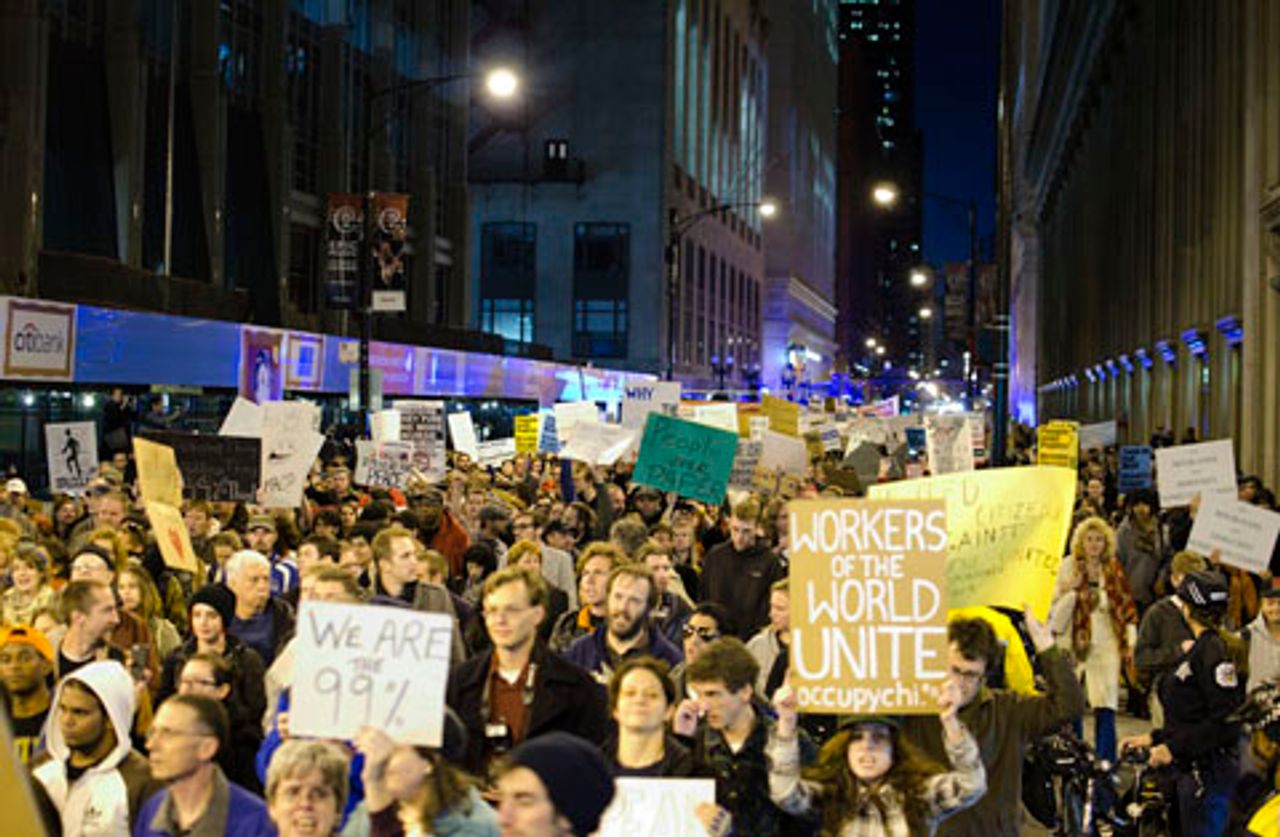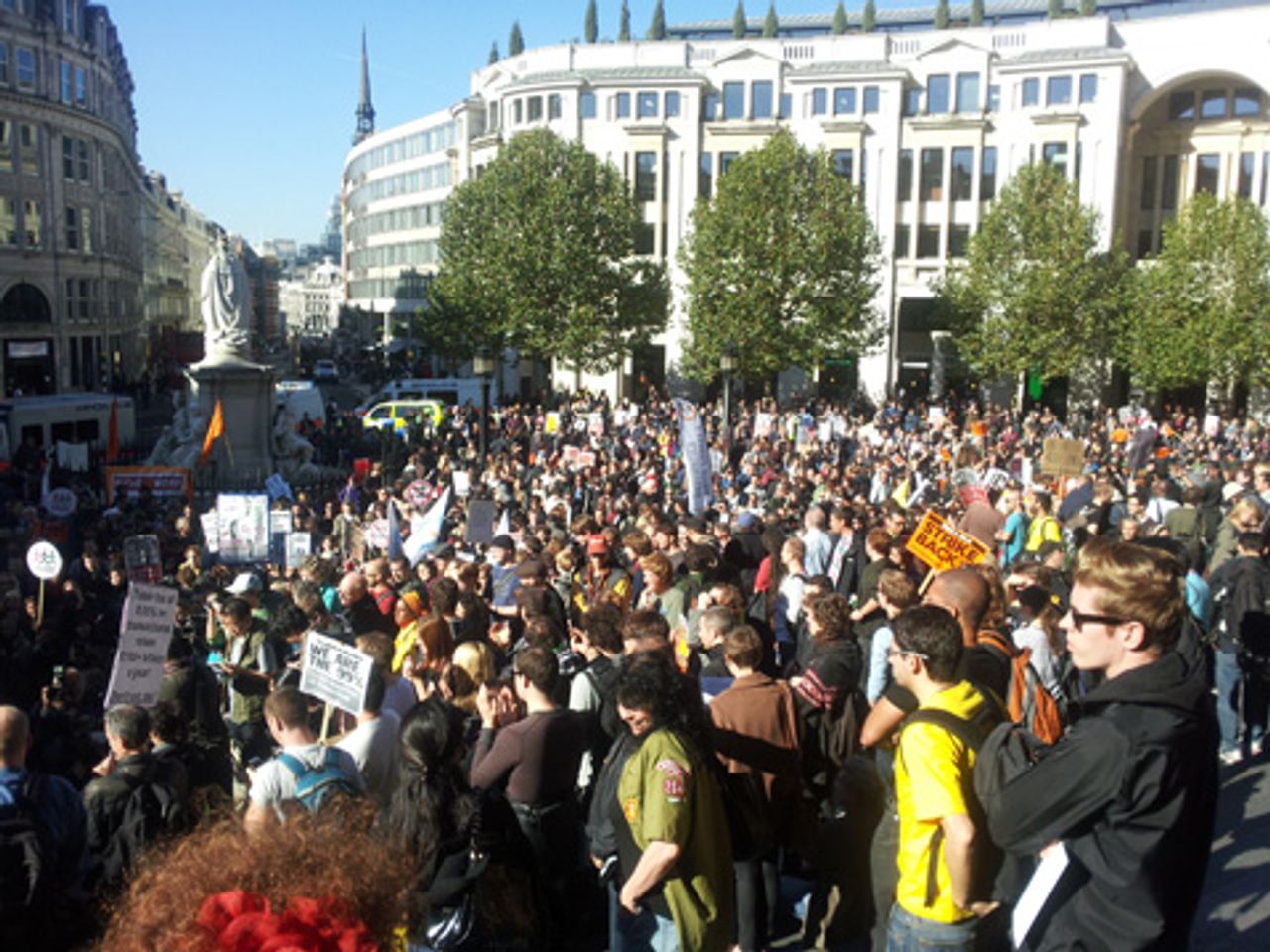 The Occupy Chicago demonstration
The Occupy Chicago demonstrationHundreds of thousands demonstrated in cities across the globe Saturday to protest against the immense inequality that is the dominant feature of social life, both in the US and internationally. Modeled on the Occupy Wall Street protest that began in New York a month ago, protests took place in a growing number of US locations and spread to cities in Europe, Australia, New Zealand and Asia.
The call for international protests met its most powerful response in Europe, particularly in those countries facing the most draconian austerity measures. In Spain, more than three quarters of a million took part in the demonstrations, while upwards of 70,000 protested in Portugal. More than 100,000 took to the streets in Rome.
Protests and occupations are ongoing in more than 100 US cities. Tens of thousands have come out to protest the domination of society by the financial aristocracy and the banks, as well as the growth of joblessness and student debt and the deterioration of social conditions for the vast majority of Americans, even as the richest 1 percent continues to amass ever-greater fortunes.
The real attitude of the political establishment, including the Obama administration, to this movement was expressed this weekend in the increased use of police repression against occupations and protests in the US and elsewhere. Protesters are facing charges of illegal assembly, trespassing and curfew violations for exercising their basic right of political assembly and speech.
Police arrested 175 Occupy Chicago protesters following a march on Saturday by some 2,000 people from the Federal Reserve Bank to Grant Park, where protesters had set up tents. Beginning at about 1 a.m. Sunday, police moved in on the protesters, who had formed a human chain, arresting them and dismantling their tents. (See Chicago report)
In a day of protests in New York City, close to a hundred people were arrested, including about a dozen who entered a Citibank branch and refused to leave. Fourteen others were arrested near Washington Square for violating a midnight curfew. (See New York report)
In Minneapolis, one woman was arrested for trespassing. About 150 people were camped out under a canopy near city hall after police took away their tents. CNN quoted organizer April Lukes-Streich: “It’s cold. We don’t have any protection from the elements.”
In Phoenix, Arizona, just after midnight Saturday, about 40 protesters were arrested and hauled away by police from Margaret T. Hance Park. Witnesses reported that baton-wielding police roughed up demonstrators.
Early morning on Friday in Denver, Colorado, dozens of police in riot gear and carrying batons pushed protesters out of their encampment in Civic Center, near the state capitol building. The Denver Post reported 24 arrests. Authorities dismantled dozens of tents.
Nineteen people were arrested in Raleigh, North Carolina and cited for trespassing after their permit to demonstrate on the grounds of the state capitol expired.
The political establishment and various local authorities, who began to move more aggressively against protesters over the weekend, are also seeking ways to dissipate and strangle the movement politically. In particular, Democratic Party politicians claiming to support the protests are seeking to channel the deep-rooted anger of the mostly young demonstrators into support for the reelection of President Barack Obama and the Democrats.
They are being assisted in this effort by the trade unions and the various middle-class pseudo-left and liberal organizations—such as the International Socialist Organization and the Nation magazine—which function as agents of the Democratic Party and defenders of the corporate-controlled two-party system.
Obama on Sunday invoked the name of Martin Luther King at a dedication to a new memorial on the National Mall in Washington to provide a backhanded defense of Wall Street bankers. “Dr. King would want us to challenge the excesses of Wall Street without demonizing those who work there,” Obama declared.
Democrat Deval Patrick, Massachusetts governor, appeared at the Occupy Boston tent city on Saturday afternoon. Patrick, who has presided over millions of dollars in budget cuts, said he had come to gain a “better understanding” of what was happening at the Dewey Square protest. He was given a tour of the grounds by a fawning group of protest organizers.
Other protesters were not as welcoming of the governor. A Boston teacher called out, “He’s part of the problem.” Another person said, “He’s part of the 1 percent.” Organizers chatting with Patrick told them to shut up. One protester told the World Socialist Web Site, “The fact that he’s trying to use this protest to his advantage is disgusting and morally corrupt. He has a $4 million house.”
The Anti-Wall Street movement—which is echoed in protests around the world—signals the end of a long period in the US in which the class struggle has been suppressed. The protests have become part of an international movement whose main demand is an end to social inequality and the domination of the banks. It expresses the growth of anti-capitalist sentiment among workers and young people internationally.
In Rome, where over 100,000 demonstrated against the hated government of Silvio Berlusconi, protesters were met with police violence. Police fired teargas and used water cannon, forcing peaceful demonstrators and local residents near the Colosseum and St. John’s Basilica to seek shelter in hotels and churches.
In Madrid, Spain, hundreds of thousands—up to half a million according to some estimates—gathered in Puerta del Sol after marching from Plaza de Cibeles and demonstrating in front of the Banco de España, Spain’s central bank. Banners read: “Let the crisis be paid for by those guilty of causing it,” and “Europe of the people, not of the merchants.”
In Barcelona, up to 250,000 took to the Plaza Catalunya. There were no nationalist flags or trade union banners in a sea of homemade placards. Demonstrations were held in an additional 80 Spanish cities, including a gathering of 50,000 in Seville and one of 35,000 in Valencia.
In Portugal, 50,000 people marched on the parliament in Lisbon, breaking through a police cordon to occupy its marble staircase. Days earlier, Portugal’s right-wing coalition government announced its savage austerity budget.
Responding to the government’s measures, demonstrators shouted, “IMF, get out of here now!” and “This debt is not ours!” A group of young demonstrators broke into the parliament shouting, “Invasion, invasion!” In addition, at least 20,000 rallied in Oporto, Portugal’s second city. A general strike may be called next week.
In Athens’ Syntagma Square, 7,000 to 10,000 gathered in front of the parliament. Hostility centred on the social democratic PASOK government’s austerity measures. Most saw the protest as an adjunct of a general strike scheduled for Wednesday and Thursday.
Elsewhere, the demonstrations were smaller—ranging between 1,000 and 5,000. They were politically dominated by various petty-bourgeois fake-left groups and anarchists, but attracted a layer of mainly young people looking for a way to oppose the austerity measures being imposed across the continent.
 The Occupy London demonstration
The Occupy London demonstrationIn London, around 4,000 protesters massed outside St. Paul’s Cathedral but were prevented from getting anywhere near the London Stock Exchange in nearby Paternoster Square by a police kettling operation. A small demonstration was also held in Edinburgh.
In Germany, a demonstration of several thousand took place in Berlin and a larger protest of 5,000 was held in the financial capital, Frankfurt, where protesters rallied in front of the European Central Bank headquarters.
In Croatia, over 5,000 people protested in the capital, Zagreb, with demonstrations also held in Rijeka, Pula and Split. In Slovenia, where the government collapsed recently, protests were held in Ljubljana, Kopar and Maribor. Smaller protests of up to a few hundred people were held in Sarajevo and Banja Luka in Bosnia and Herzegovina, as well as in Belgrade, Serbia and Podgorica, Montenegro.
The protests were somewhat smaller in Asia. Occupy Tokyo attracted about 300 protesters. The main protest was held in front of the Tokyo Electric Power Company (TEPCO), the owner of the stricken Fukushima nuclear power plant.
In South Korea, despite rainy and cold weather as well as open threats of a violent response by the police, some 600 Occupy Seoul protesters turned up at Seoul Station and marched to the popular shopping district. One chant on the protest was: “Bad capitalism is not the problem—the problem is capitalism.”
A WSWS correspondent noted of the Seoul protest: “In preparation, dozens of police officers were bussed in, equipped with riot shields and a police truck fitted with a water cannon on standby. Protesters were barred from leaving a designated area, which was cordoned off with large barriers and then surrounded by regiments of officers holding their riot shields at the ready. The purpose was to intimidate protesters and passers-by.”
In Taipei, about 300 demonstrators, mainly students, sought to surround the city’s tallest building, Taipei 101, and protesting against the unequal distribution of wealth in Taiwan and the lack of future for the young people. In Hong Kong, about 200 people rallied at Exchange Square, near the International Finance Centre, the heart of the city’s banking and financial district.
The Socialist Equality Party and International Students for Social Equality intervened at many of the demonstrations with statements addressed to both the US and international protests (see “The way forward in the fight against Wall Street“ and “Politics and the international Occupy movement“).
SEP and ISSE supporters put forward a program for the independent political mobilization of the working class in the struggle against the capitalist system as the only means to secure workers’ social rights, including the right to a job and to high-quality public education and health care. The statements distributed in the thousands stressed that the fight against the domination of the financial aristocracy and for equality was an international struggle and called for the unification of working people of all countries to fight for socialism.
Today, the WSWS begins coverage of the weekend’s protests with on-the-spot reports from the US, Europe, Canada, Australia and New Zealand. We will post additional reports in the coming days.
